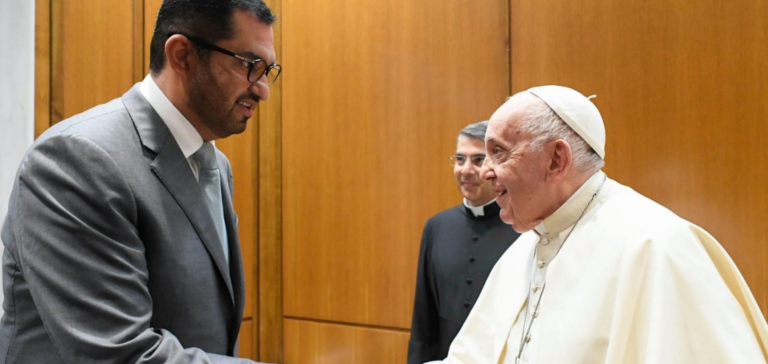In December, the world will see an unprecedented event: Pope Francis, spiritual leader of over 1.3 billion Catholics, will speak at COP28 in Dubai. This eagerly-awaited speech symbolizes not only religious involvement in environmental issues, but also an attempt to reconcile faith and science in the urgent battle against climate change.
Pope Francis: A Bridge between Faith and Environment
Francis, elected in 2013, has always placed ecology at the heart of his pontificate. His speech at COP28, scheduled for December 2, promises to highlight the inaction of nations in the face of climate change and call for a significant reduction in greenhouse gas emissions. This papal participation is a first since the COP was set up in 1995, and could play a decisive role in building trust between vulnerable countries and polluting developed economies.
Laudato si and Laudate Deum: Pioneering Texts
Pope Francis has long emphasized the close link between climate change and poverty, insisting that marginalized communities are the most affected by global warming. This sensitivity to environmental challenges manifested itself as early as 2015 with the publication of his encyclical “Laudato si” (“Praise be to you”), a 200-page manifesto advocating an “integral ecology”. This work, based on scientific studies, has had a worldwide impact, triggering debate and comment even in scientific journals.
Vatican Ecological Initiatives
More recently, in response to the UN’s failure to meet its commitments on global warming, the Pope published “Laudate Deum” (“Praise God”), urging the major powers to abandon fossil fuels. In it, he depicts a world on the brink of “breaking point”, and calls on COP28 to be a decisive “turning point” for an energy transition to cleaner sources.
Interfaith Climate Commitment
The Vatican has also taken concrete steps in the field of ecology. Francis’ predecessor, Benedict XVI, launched the Vatican’s ecological initiative with the installation of solar panels in 2008. Today, the Vatican is aiming for a 20% reduction in its gas emissions by 2030 compared with 2011. Although symbolic, this commitment reflects a growing awareness of environmental impacts.
Another notable aspect of the Vatican’s involvement in climate issues is its participation in an interfaith declaration signed recently with various leaders, including the environmentalist rabbi David Rosen and the Grand Imam of the Al-Azhar mosque in Cairo. This declaration underlines the growing commitment of religions to the fight against climate change.
Pope Francis’ involvement in COP28 is not just a symbolic gesture, but a call to action in the face of the climate emergency. By joining the spiritual voice to science, the Pope hopes to influence decisions crucial to the future of our planet. This summit could well be a decisive moment, when faith and politics unite for the common good.






















